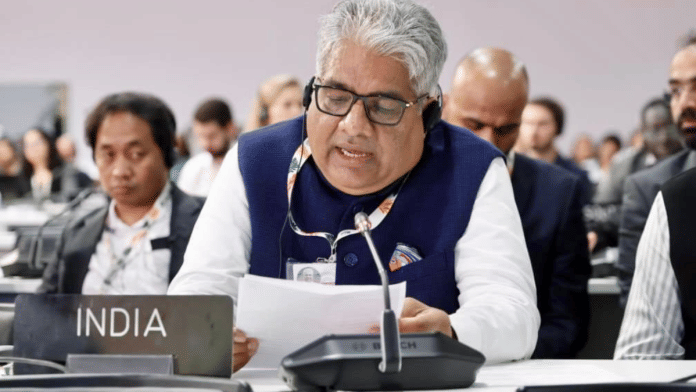New Delhi: India has been advancing its own adaptation efforts through domestic budgetary resources, even as the global community delays action on climate adaptation finance. At the Baku High-Level Dialogue on adaptation at the UN COP30 summit in Belem, Brazil, Environment Minister Bhupendra Yadav said securing adequate adaptation finance remains a major challenge for India.
“Despite the challenges, India continues to act as adaptation is a key priority. India is mainstreaming adaptation through the National and State Action Plans through domestic budget allocations,” Yadav said Thursday.
The negotiations on the final text had to be halted after a fire in the venue’s Blue Zone resulted in an immediate evacuation and closure of the conference area for the day.
The United Nations Framework Convention on Climate Change (UNFCCC) later said the fire has been contained with limited damage. “Delegates are advised that the venue will not reopen before 8pm,” it said.
Earlier, Yadav responded to a dialogue question on key barriers that make adaptation finance, including from multilateral funds, difficult to access.
“Access to multilateral climate funds is often complex and slow due to procedural requirements, high transaction costs, and limited institutional capacity. Absence of clear revenue streams or risk-sharing instruments affects ability to mobilise private finance,” the minister said.
Noting the need for grant-based and concessional finance, Yadav warned that the Glasgow Climate Pact goal of doubling international public adaptation finance from 2019 levels to around $40 billion by 2025 will be missed if current trends continue.
“It will take nothing less than a global collective effort to increase climate finance to the levels articulated in the Baku to Belém Roadmap to $1.3 trillion,” he said.
India also used a separate ministerial meeting to underline that a fair global transition cannot be reduced to a narrow energy discussion. At the Third High-Level Ministerial Roundtable on Just Transition, the environment minister said the term must reflect an “economy-wide, all-inclusive, people-centred transformation” and stressed that countries must have the space to design their own pathways.
“A just transition is not limited to an energy transition,” Yadav said, warning against any prescriptive or uniform model that ignores national circumstances.
Pointing to the wide differences in development levels, he said many countries were starting from “very different points,” making nationally determined approaches essential. He also criticised the rise of unilateral climate-linked trade measures.
“[These] undermine the principles of equity and justice embedded in the Convention and the Paris Agreement, and act as serious dis-enablers of a fair and equitable just transition,” he said.
India joined other developing countries in calling for the establishment of a dedicated Just Transition Mechanism.
“Such a mechanism is essential for identifying gaps and advancing practical solutions. For the Global South, affordable and adequate access to finance, technology, and capacity building—aligned with national circumstances—is vital to ensure that no one is left behind,” Yadav said.
On what key message should emerge from COP30, the minister said the message must be clear and forward-looking: “Adaptation is not an optional add-on but an essential investment.”
As to what would ensure stronger political and financial commitments on adaptation, Yadav said that while progress on adaptation reflects collective commitment, “it must remain country-driven and nationally determined”.
“Countries need flexibility to define and measure progress using national systems, capacities, and data realities.”
Yadav added that in the run-up to COP31, practical arrangements would be needed to translate ambition into measurable progress. “Indicators [of progress] should remain voluntary, non-prescriptive, and subject to national interpretation.”
(Edited by Tony Rai)
Also Read: India’s NDCs by Dec, Bhupender Yadav tells developed nations at COP30 to speed up net-zero targets






